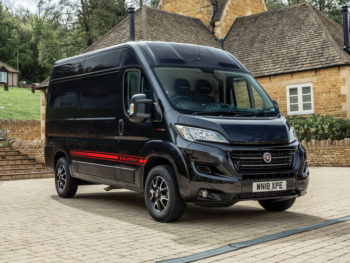With an updated Ducato and an electric model on the way, Fiat Professional’s country manager Richard Chamberlain is feeling positive, says Dan Gilkes.

UK country manager
As LCV manufacturers rush to be part of the growing move towards electric vans, Fiat Professional is preparing to launch its first foray into the UK BEV market. The Ducato Electric will be offered in panel van, chassis cab and people moving variants, with gross weights up to 4.2-tonnes, body volumes of 10-17m3 and a choice of battery packs.
A 47kWh battery will offer up to 136 miles of range (NEDC), while a 79kWh pack should provide up to 223 miles. Both will be offered with a 50kW fast charge capability, allowing a 62-mile top-up in just 30 minutes. Payloads will run from 1,100-1,950kg.
An early right-hand drive model should be available for early adopting customers to test next month, with pricing announced in Q1 and orders being taken in Q3. UK deliveries will start in August or September.
Unsurprisingly, UK country manager Richard Chamberlain is excited by the prospect of a full electric Ducato, which comes hot on the heels of the updated Ducato range, now incorporating Euro 6D-Temp engines and Fiat’s first nine-speed automatic transmission.

“Ducato is our most important product, it is a market leader across Europe,” said Chamberlain.
Indeed, even with an outgoing model, Fiat saw UK Ducato sales rise by 6% in 2019, in a market sector that was only up by 2.5%. Admittedly, part of that success comes from Fiat’s dominance of the motorhome market, where the arrival of a nine-speed automatic transmission has been particularly welcomed.
“Clearly we’re UK leader in the motorhome market and we’ve seen a disproportionate increase in the nine-speed auto,” said Chamberlain.
However, automatics are a popular choice with supermarket deliveries too, where discussions are now ongoing and also with the ambulance sector, where Ducato has become a strong player.
“We are key suppliers to all ambulance trusts in the UK, we work very closely with them,” said Chamberlain.
But the home delivery market is looking for lower emissions as well, which is where Ducato Electric comes in. Chamberlain’s ambitions for the BEV van are fairly conservative, with sales predicted to be in the hundreds during the first six months of sales, but he has bigger plans for the future.
“There are still some real challenges. Residual values in particular need to be recognised by the industry for EVs,” he said.
“But there is going to be a big drive to reduce emissions in cities. The solution is electric and we’ve got to get there as quickly as possible.”
Fiat is also benefitting from the recent update to Renault’s Trafic mid-weight van, which is rebadged and sold as a Talento by the Italian firm. Admittedly, it looks as if Fiat will be making a move back to a PSA-based model in the coming years, as PSA and FCA join forces, but for now, the new 2.0-litre Talento shows plenty of promise.
“Talento is a big opportunity for us in 2020 and it has started very positively,” said Chamberlain.
“We have never been very big in that segment, but across Europe we are now outselling the previous generation Scudo volumes.”
Fiat also continues to hold its own in the smaller van sectors. Fiorino volumes doubled last year, to around 900 vans, while Doblo Cargo maintained its position in the high cube market. The company has however pulled out of its badging deal with Mitsubishi, dropping the slow-selling Fullback pickup in August of last year. But Chamberlain is upbeat about the coming year.
“The SMMT is forecasting the market to be down slightly in 2020. Personally, I think there is more confidence out there. I see a similar volume year, but without the peaks and troughs of WLTP and Brexit. I think our volumes will be fairly static, in line with 2019.”

